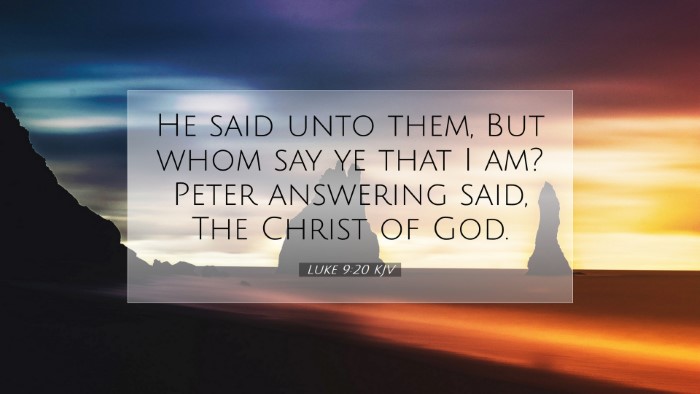Commentary on Luke 9:20
In Luke 9:20, Jesus poses a poignant question to His disciples, asking, “But whom say ye that I am?” This moment is significant, encapsulating a turning point in the ministry of Christ and revealing the depth of discipleship and understanding required of His followers.
Understanding the Context
This verse occurs after Jesus has performed numerous miracles and taught profound truths about the Kingdom of God. The earlier verses establish a backdrop of public perception regarding Jesus, wherein various opinions regarding His identity are bandied about among the people (Luke 9:18-19). He is compared to prophets of old, but the question posed directs the attention of His disciples inwardly, prompting them to confront their understanding and belief regarding His true nature.
Insights from Matthew Henry
Matthew Henry emphasizes the significance of this inquiry, suggesting that it serves to elicit a personal conviction from the disciples. He notes:
- Personal Recognition: Henry highlights the importance of recognizing Jesus personally, underscoring that true discipleship requires an acknowledgment of Christ's divine identity and mission.
- Confession of Faith: This question compels believers to affirm their faith openly, which is crucial for spiritual maturity and the foundational aspect of the church.
- Christ’s Authority: He further elaborates that the correct answer to this question is paramount as it sets the stage for understanding Christ's authority and His role as the Messiah.
Insights from Albert Barnes
Albert Barnes elaborates on the implications of the question for the disciples. He points out:
- The Nature of Faith: Barnes emphasizes that true knowledge of Christ goes beyond mere acknowledgment of His miracles; it involves a deep, personal faith that acknowledges Him as the Son of God.
- Recognition of Christ's Identity: He argues that the disciples' response reveals their inner transformation and understanding of Christ's essence as more than a mere teacher or prophet.
- Importance of Declaration: The need for believers to publicly declare who Jesus is, demonstrates the necessity of living out one’s faith and being a witness to others.
Insights from Adam Clarke
Adam Clarke provides a unique angle on the verse, emphasizing the experiential aspect of knowing Christ:
- Spiritual Revelation: Clarke posits that the knowledge of Christ is not solely intellectual but involves a spiritual revelation that God imparts to individuals.
- Contrast with Wider Perception: He contrasts the disciples' understanding with the general public's misconceptions, suggesting that a true revelation from God leads to correct understanding of Christ.
- Call to Discipleship: The inquiry also acts as a call to discipleship, compelling followers to make a commitment that influences their lives, actions, and declarations in the world.
Theological Implications
The theological weight of Luke 9:20 is immense; it highlights several key aspects of Christian belief:
- Christology: The verse is foundational in Christology, establishing the understanding of Jesus' identity as both fully divine and fully human, which is essential for orthodox Christian faith.
- Discipleship and Identity: The passage underscores the relationship between discipleship and identity, pointing out that understanding who Jesus is directly affects how one lives and acts as a follower of Christ.
- The Role of Revelation: It invokes the necessity of divine revelation in truly knowing Christ, reinforcing the idea that human intellect alone cannot grasp the fullness of Christ’s identity.
Application for Today
This questioning by Jesus invites us today to reflect personally and communally on who we profess Him to be:
- Personal Reflection: Pastors and theologians are encouraged to engage their congregations in this memory, prompting believers to articulate their understanding of Christ’s identity.
- Cultivating Faith: Students of the Bible can use this verse as a catalyst for deeper study and understanding of theological truths about Jesus, fostering a robust faith that can withstand challenges.
- Public Declaration: All believers are called to live out their faith publicly, sharing their understanding of Jesus in their communities, confronting misconceptions and proclaiming Him as the true Messiah.
Conclusion
In reflecting on Luke 9:20, we are beckoned to a journey of deeper understanding and commitment to Jesus Christ. The challenge posed to His disciples echoes through the ages, urging us to recognize and declare with clarity who Jesus is. This acknowledgment fuels our faith, informs our discipleship, and empowers us as agents of His Kingdom.


